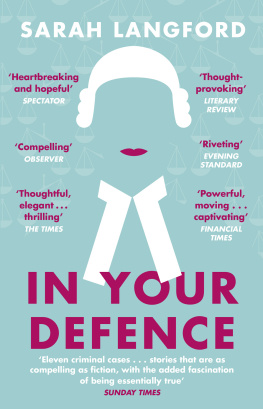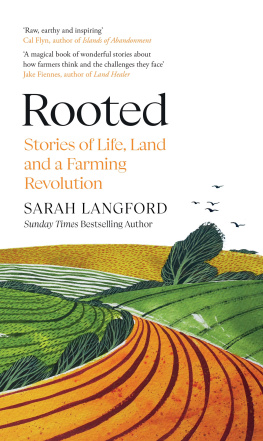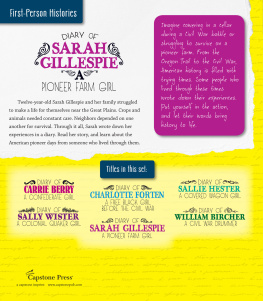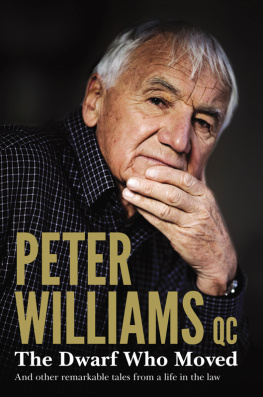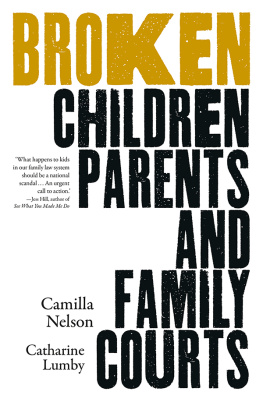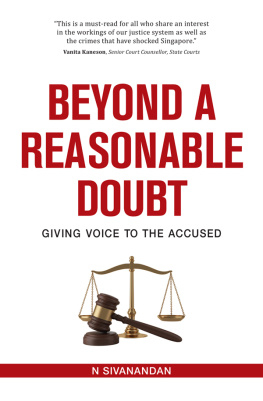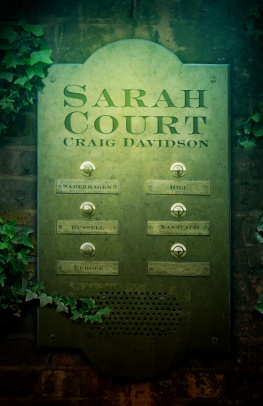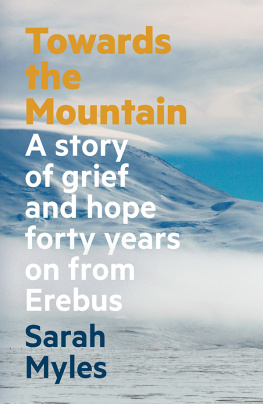IN YOUR DEFENCE
Stories of Life and Law
Sarah Langford
To my two small sons, Wilfred and Aubrey.
You brought me back to earth.
Foreword
THE LAW. A great and ancient institution filled with strange words and rituals, impenetrable to those outside it. A place where steel-hearted lawyers in costume dissect peoples lives in a quest for truth, with no understanding of, or place in, the modern world.
Thats what I thought too.
I am not most peoples idea of a stereotypical barrister. I am not a man, I did not go to a top university, nor do I come from a family of lawyers. I studied an English degree because I loved the way that words transported me into someone elses life so that I could better understand them. And this, I later discovered, is exactly what barristers do too. For behind the clever arguments spun from the pages of a law book there is always a human tale. It is my job to help my clients fit their lives, in all their messy shades of grey, within the black and white of the law by telling their story, and telling it well.
This book contains the stories of eleven people I represented in both the criminal and the family courts. All of their lives were changed by the law, for better or for worse, for ever. But often I was changed too. I began to wonder whether I was really so different from the people I represented, or whether, but for a twist of fate, their stories could have been mine.
Although the evidence in every criminal case is a matter of public record, I have changed everybodys names from clients to witnesses to lawyers as well as their physical description and the location of their case to ensure that no one is identifiable. Sometimes I have also changed their gender and racial origin and a distinguishing piece of evidence but otherwise each story is entirely true. I have done so because this book is not about the individuals involved in the cases I have described, but about what we can learn from the events that took place and how they shape our society. Every family law chapter is the result of blending several different cases together and presenting it as one when it is really a mash of many. In these too, names, descriptions, genders and locations have all been changed. This is to preserve the anonymity the family courts demand, but it also shows how, so often, the issues are the same even when the facts are different. In my Notes on the Law I have explained any technical terms and supporting statistics, and given details of any changes to law and procedure.
Following a case from its beginning to its end you will learn something of the law and its process. I hope you will also discover what it feels like to be the one in the wig, standing up before judge and jury as an instrument of the system. This is not a book of anecdotes; it is a book of people. These are stories of heartache and humour, of high drama and quiet pain, which have challenged my preconceptions and taught me that nothing is ever one thing. For me each case brought to life ideas which otherwise so often appear in abstract: fairness, justice, truth. I hope that, in reading them, they do the same for you.
1
Dominic
Oxford Magistrates Court
and Oxford Crown Court
Children and Young Persons Act 1933
Section 50 Age of criminal responsibility
It shall be conclusively presumed that no child under the age of ten years can be guilty of any offence.
DOMINIC FELT THE metal tang of blood in his mouth as he ran, fast, through the tunnel. His breath came out in rasps, echoing against the brick. He could hear the footsteps of the five police officers as they entered the mouth of the underpass behind him. The muscles in his legs burned as he tore out of the gloom and into the summer dusk, and he felt his knees weaken. He stumbled, slowed, and came to a stop. Panting hard, he bent and rested his hands on his thighs. Lifting his head, he looked at the hill path ahead of him. He was never going to make it. Almost with relief, he stood and staggered back to the exit of the tunnel, waiting for the officers to reach him. He leaned back against the raw brick and realized that he was still very drunk. As the officers got closer, Dom held up his left hand towards them, palm outwards, and looked down to spit out a shining gobbet of saliva. A moment later, he felt himself taken forward with a force so great it sent him face downwards on to the dirt path. He recognized the wrench in his shoulders as his arms were pulled back, and the rub of metal to his wrist bones as handcuffs closed around them. He felt the deeper pain of a thick-soled boot in his ribs, on his spine; the full weight of a grown man kneeling on the back of his legs. He managed to turn his head just in time to see the tread of a large black boot closing down upon his face. In the background he could hear his friend, Caz, who had now caught up with them, screaming. As his body buckled, Dom remembered, almost in abstract, that it was his nineteenth birthday.
When I was at law school I was taught to memorize things I would rarely use again. The difference between various types of Will. How to distinguish a joint tenancy and a tenancy-in-common. Why an invitation to treat was not as exciting as it sounded. What I was not taught was how to represent a child.
In my first few years as a barrister I realized that this was a skill so vital I must master it for myself. I began to understand that representing those charged with a criminal offence meant that I was more than just a source of advice, or a mouthpiece for my clients case. I needed to be a psychiatrist, a counsellor, a social worker, a mother, and many other things besides, none of which had appeared on the pages of my law books. I had to learn how to identify mental health problems, victims of domestic abuse, alcohol and drug addictions. I grew to know who might, after court had finished, go home and try to end their life.
But the cases that first asked the most of me were those in the youth court. I would sit with my teenage clients in the hallway of the courthouse, trying to take their instructions on the trial they were about to face as they stared at their phones, or the floor, or the sky through the window, or anywhere but at me. I became familiar with courtrooms made up of desks rather than benches. Our hearings had breaks to maintain their short attention spans, and reminders to use language my child offender could understand. I learned to play paper-scissors-stone with my younger clients under the desk, to keep them occupied while we waited for the magistrates to return with their inevitable guilty verdicts. I worked out how to talk to twelve-year-olds in a Ritalin stupor; how to ask them about the summer when they robbed, threatened and stabbed their way through the nights. I also discovered, crucially, that my clients did not want me to try to be their friend. Too often they would treat the social worker who came in lieu of an absent parent, with a sing-song voice and attempts at camaraderie with withering contempt. I tried to convince my young clients that deference was not the same as weakness. In doing so I gained their trust and, occasionally, respect. This respect would enable me to hush the gang of twenty waiting in the corridor for their missing member; or to chase my teenage client down the court stairwell, persuading them to come back to the courtroom and face their custodial sentence.
When I first met Dominic he had turned eighteen, and so, now technically an adult, his criminal career had moved from the youth court up to the magistrates and crown courts. But it was the youth court that marked his first conviction for burglary, not long after his eleventh birthday. In that same year, still not into adolescence, Dominic was sentenced twice more, just three months apart. If he had lived anywhere else in Europe he would, at eleven years old, still have been considered a child. But Dominic lived in England and so, from the age of ten, he was old enough to be a criminal.

